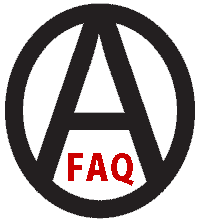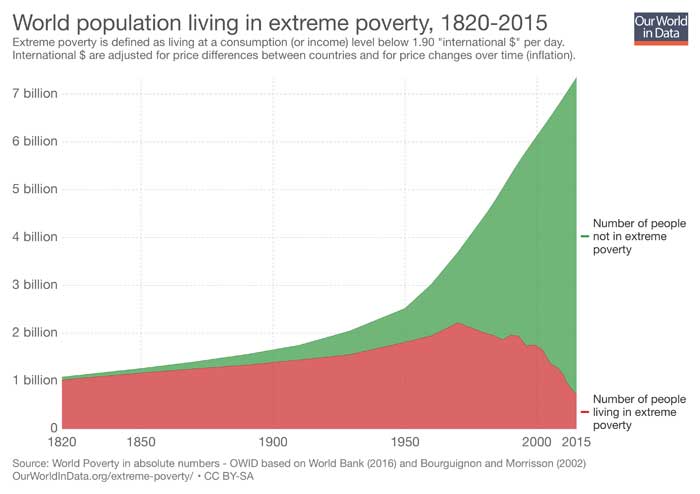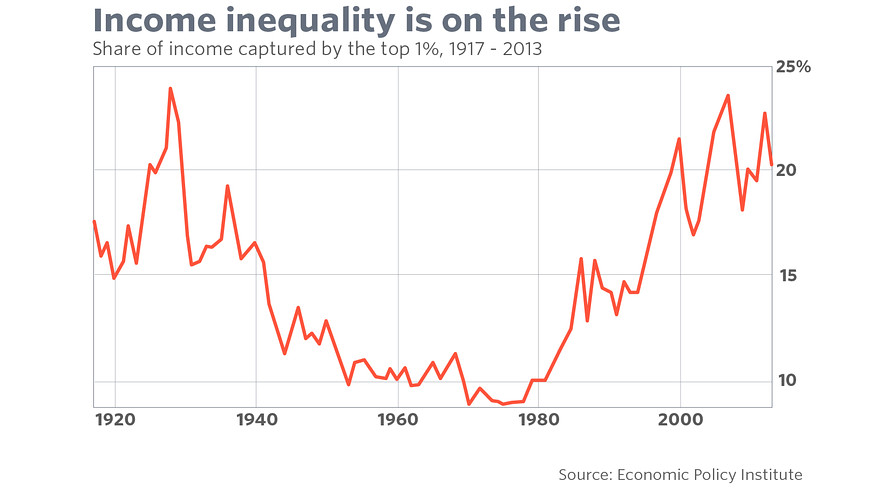
The Anarchist FAQ
Liberty is the mother, not the daugher, of order.
III. How does anarchism help solve our major problems?
In Section I we cited four looming crises:
- Social breakdown - rising rates of poverty, homelessness, crime, violence, alienation, drug and alcohol abuse, social isolation, ignorance, etc.
- Organized mass murder (war) and the proliferation of WMDs - weapons of mass destruction.
- Organized plunder of society - the theft of people's wealth by taxation, tolls, licensure, fiat currency, etc.
- Environmental destruction and pollution of the planet’s ecosystems on which life depends.
In this section we examine these "asteroids" from an anarchist perspecitive. Our solutions involve freedom of association and decentralization. Liberty is the best way to address all these chronic wicked problems.
III.A - What does anarchism say about social breakdown?
Before the industrial revolution, property rights were decreed and caste-based. Only the king and his princes and lords could own land and other factors of production. As feudalism broke down, so did this caste system. The right to own property was expanded to more and more people. Despite significant State intervention, this expansion of property rights to the masses significantly reduced poverty.

Poverty can be alleviated or reduced, and in the Western world in the last two centuries it has been almost miraculously alleviated and reduced; but poverty is ultimately individual, and individual poverty can no more be "abolished" than disease or death can be abolished.Individual or family poverty results when the "breadwinner" cannot in fact win bread; when he cannot or does not produce enough to support his family or even himself. And there will always be some human beings who will temporarily or permanently lack the ability to provide even for their own self-support. Such is the condition of all of us as young children, of many of us when we fall ill, and of most of us in extreme old age. ...
All this is merely stating in another form the Paradox of Relief:
The richer the community, the less the need for relief, but the more it is able to provide; the poorer the community, the greater the need for relief, but the less it is able to provide.And this in turn is merely another way of pointing out that relief, or redistribution of income, voluntary or coerced, is never the true solution of poverty, but at best a makeshift, which may mask the disease and mitigate the pain, but provides no basic cure.
Moreover, government relief tends to prolong and intensify the very disease it seeks to cure. Such relief tends constantly to get out of hand. And even when it is kept within reasonable bounds it tends to reduce the incentives to work and to save, both of those who receive it and of those who are forced to pay it. It may be said, in fact, that practically every measure that governments take with the ostensible object of "helping the poor" has the long-run effect of doing the opposite.
— Henry Hazlitt, The Cure for Poverty
Government intervention in the economy and plunder through taxes and inflation retarded prosperity, and the looted wealth was funneled to cohorts and cronies. This resulted in wealth inequality. As long as money was connected to gold or silver (if not fully redeemable), governments were compelled to show some restraint in money creation. After 1973, when the world went off the commodity standard, money creation started increasing exponentially. As a result, wealth inequality also increased dramatically.

Anarchists oppose all government intervention in the economy, including:
- minimum productivity ["wage"] laws
- occupational licensure
- licensing of devices or products
- forced labelling laws
- government inspections of goods
- forced "quality" or "safety" laws
- price fixing, e.g. "living wage" laws, rent control
- protectionism
- both "right to work" laws and "forced negotiation" laws
- anti-freedom of association laws, e.g. "anti-discrimination" laws
III.B - What does anarchism say about war?
Anarchists oppose war, which they consider to be State organized mass murder. Virtually all wars are "State on State." Since States maintain standing armies, they are a danger to other States. American general turned anti-interventionist Smedley Butler explained how government militaries are little more than gangsters for rulers and their cronies.War is a racket. It always has been. It is possibly the oldest, easily the most profitable, surely the most vicious. It is the only one international in scope. It is the only one in which the profits are reckoned in dollars and the losses in lives. ... Only a small 'inside' group knows what it is about. It is conducted for the benefit of the very few, at the expense of the very many. Out of war a few people make huge fortunes. — Smedley Butler, War Is a RacketThe same non-aggression criteria that anarchists use for individuals applies to groups of people.
Suppose that Jones, in the course of his "just war" against the ravages of Smith, should kill a few innocent people, and suppose that he should declaim, in defense of this murder, that he was simply acting on the slogan, "Give me liberty or give me death." The absurdity of this "defense" should be evident at once, for the issue is not whether Jones was willing to risk death personally in his defensive struggle against Smith; the issue is whether he was willing to kill other people in pursuit of his legitimate end. For Jones was in truth acting on the completely indefensible slogan: "Give me liberty or give them death" surely a far less noble battle cry.
The libertarian's basic attitude toward war must then be: it is legitimate to use violence against criminals in defense of one's rights of person and property; it is completely impermissible to violate the rights of other innocent people. War, then, is only proper when the exercise of violence is rigorously limited to the individual criminals. We may judge for ourselves how many wars or conflicts in history have met this criterion. — Murray Rothbard, War, Peace, and the State
“When men hire themselves out to shoot other men to order, asking nothing about the justice of their cause, I don’t care if they are shot themselves.” — Herbert Spencer, Patriotism
III.C - What does anarchism say about government plunder of society?
Franz Oppenheimer famously defined the State as "the organization of the political means." In his terminology, the political means was the system of sustainable plunder which the rulers seek to impose, in contrast to the "economic means" of voluntary trade used by productive people. Most modern anarchists add the social plunder condition to the monopoly of force condition when defining anarchy. For example:
The State is that organization in society which attempts to maintain a monopoly of the use of force and violence in a given territorial area; in particular, it is the only organization in society that obtains its revenue not by voluntary contribution or payment for services rendered but by coercion. While other individuals or institutions obtain their income by production of goods and services and by the peaceful and voluntary sale of these goods and services to others, the State obtains its revenue by the use of compulsion; that is, by the use and the threat of the jailhouse and the bayonet. - The Anatomy of the State, Murray Rothbard
III.D - What does anarchism say about the environment?
The most environmentally destructive force is compulsory government. The most destructive agencies of governments are their militaries. But besides these errors of commission, there is a major error of omission that governments make - failure to allow property norms to be defined. Thus, without norms, we get the infamous 'tragedy of the commons' in our air and water. Furthermore, States generally allow special interests (in addition to the military) to pollute at will, in effect selling licenses to pollute.
Free Market Environmentalism (FME) is an approach to environmental problems that focuses on improving environmental quality using property rights and markets. It emphasizes three important points:— PERC.org
- Markets, property rights, and the rule of law are fundamental to economic growth, and economic growth is fundamental to improving environmental quality. There is a strong correlation between treatment of the environment and standards of living.
- Property rights make the environment an asset rather than a liability by giving owners an incentive for stewardship.
- Markets and the process of exchange give people who have different ideas and values regarding natural resources a way to cooperate rather than fight. When cooperation supplants conflict, gains from trade emerge.